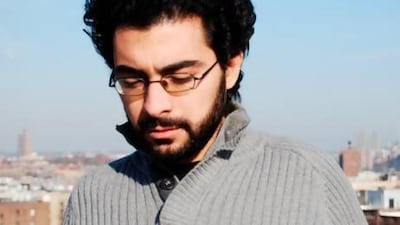"The first time I heard jazz music, it changed my world," says award-winning pianist and composer Tarek Yamani.
"The rhythm just moved me from inside out." The track was New York Minute by Herbie Hancock, played at Melody, a deserted record store in Hamra, Beirut. Yamani was a teenager.
A little over a decade later, Hancock himself introduced Yamani at the opening concert of the UN International Jazz Day in April 2012. There, the pianist performed John Coltrane's India with Wayne Shorter and Zakir Hussein. Yamani had been selected to perform after winning the Thelonious Monk competition for his composition Sama'i Yamani.
That composition is Yamani's jazzy reinterpretation of the Sufi tradition of Sama'a music. "I wanted to approach this Arabic rhythm with Western harmonies," says Yamani, who is now 32.
"I was so immersed in the jazz language that it became another language for me." Yamani had originally asked Syrian singer Rasha Rizk to perform on the piece, but the version featured on Ashur, Yamani's recently launched album, is acoustic only.
Tom Carter, the president of the Thelonious Monk Institute, wrote in the awards letter: "The judges felt your composition was exceptional in how it weaved Middle Eastern melodies and modalities into the framework of a jazz composition, essentially showing how jazz truly is a globally inclusive art form. Your talents as a jazz composer will ensure the vitality of the next generation of jazz composers."
Yamani is passionate about bringing together rhythms from different cultures, including the Middle East, Africa, Latin America and even Gregorian and classical music, reinventing them through the prism of jazz - a genre which many critics complain has been too stale in the past decade. For example, the title song of his album, Ashur, which takes its name from the ancient capital of Mesopotamia because of Yamani's deep interest in ancient history, brings together an oriental-inspired melody and a modern jazz composition. In a bold move, Yamani replaced the traditional bass with the tuba, creating a surprising, fresh sound.
Other songs included in the album are a reinterpretation of Everybody's Got to Learn Sometime, a dabke (folk dance music), a prelude by JS Bach and three jazz classics, including Giant Trane, his homage to John Coltrane.
Last month at the Alwan Center for the Arts in New York, Yamani played all these tunes with dexterity and mastery, demonstrating a great sense of rhythm. He moved flawlessly from the funky Brazilian beats of Passeggiata to the complex, loud Coltrane tune, and then to the soft melancholy of the pop song. He ended with a touch of humour, playing his own jazzy version of Jingle Bells using Coltrane's harmonic progression (the so-called "Coltrane changes"). Yamani is scheduled to play in Dubai, Abu Dhabi, Beirut and Alexandria later this year.
Yamani was not always a professional musician. Born in Beirut, he grew up taking piano lessons, mainly focusing on classical music and later enrolling at the Conservatory. He gave up his classical training and played the electric guitar for four years, composing and experimenting with hard rock, heavy metal and rock. He enrolled in the American University of Beirut's computer engineering programme, but quickly became disenchanted with the discipline and left to again focus on music, playing with the rap band Aks'Ser.
When he discovered jazz, Yamani started listening to the albums of quintessential jazzmen - John Coltrane, Wayne Shorter, Herbie Hancock, Freddie Hubbard, Ahmad Jamal, Thelonious Monk - and teaching himself the rules of rhythm with the help of the Jazz Piano Book. "I was spending my days listening to music and studying my book," recalls Yamani.
He then played with Ziad Sahhab's band Chehhadine Ya Baladna, where he met several like-minded musicians and started to think "outside the box," experimenting with Arabic music and jazz and playing extensively, later under the band Fenjan Shay (Cup of Tea).
Feeling lonely in the desolate Beirut jazz scene, Yamani obtained a scholarship to study at the Prins Claus Conservatoire in Groningen, Holland, in 2005. "After the assassination of [former Lebanese prime minister Rafic] Hariri, everything changed," he says, "things became so dark and depressing and we got affected as musicians."
During four years in Holland he perfected not only his technique but also his style.
"I had nothing to worry about but music," says Yamani. "I learned to listen to my instinct; I understood that what speaks to me the most is rhythm, which always comes from African music. I listened to a lot of traditional music from Gambia and Ghana, and a lot of John Coltrane and Brazilian music. I also discovered many things about music and the science of music that nurtured my vision."
In 2010, Yamani began recording his own compositions, participated in various competitions and won the Thelonious Monk Award. In 2011, he moved to New York, as many aspiring jazzmen do, and began to perform in some of the city's iconic venues such as Iridium Smoke, Lenox Lounge and Smalls. "Every concert is an experience of its own," he says, "a conversation with unique expressions and it always makes you grow."
Throughout these turns and twists, these explorations, struggles and victories, Yamani has come closer to what he has always tried to grasp: rhythm.
"Jazz represents, in my opinion, freedom and spiritual union," he says. "It is one of the most sophisticated and highest forms of musical expression because it is rooted in rhythm and improvisation. Jazz is elegant and rural, complex and simple, African and non-African, and it is like any real art, transcendent of all common human notions of unlikeness such as gender, race, religion and ethnicity."
Shirine Saad is a New York-based editor and writer.

